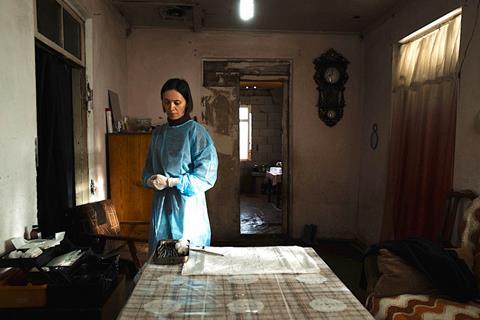An doctor in rural Georgia risks herself to care for her female patients in Dea Kulumbegashvili’s Venice Jury Prize-winning feature

Dir/scr: Dea Kulumbegashvili. Georgia. 2024. 134mins
An ob-gyn specialist in a small hospital in provincial Georgia, Nina (Ia Sukhitashvili) is dedicated to her job at the expense of everything else. But she also risks her career by covertly providing services to women that go beyond the remit of her position and, at times, the law. When a newborn baby dies a few moments after birth, Nina finds herself the subject of an investigation that threatens to reveal the extent of her activities. The second feature from Dea Kulumbegashvili, April is a formidable, defiantly esoteric work. It demands considerable investment from the audience, but does repay it.
A formidable, defiantly esoteric work
With her arresting 2020 debut Beginning, which won numerous prizes including Best Film, Director and Actress at San Sebastian, and now this formally bold and intellectually rigorous follow-up, Kulumbegashvili takes her place alongside some of the more challenging auteurs of the arthouse spectrum. Its Venice Jury Prize win will only enhance her reputation. Like Beginning, April (which features Luca Guadagnino among its producers) will likely draw comparisons to the work of Michael Haneke. But there’s also a kinship here with Johnathan Glazer, particularly Under The Skin’s blend of the uncanny and the prosaic, and with the oblique, demanding films of Angela Schanelec. It’s not a film that screams break-out commercial potential, but it will likely find receptive audiences at further festivals – following Venice, it lands in TIFF, London and New York. It should also be a picture of interest for distributors on the lookout for quality arthouse titles.
The film opens with an extended sequence that shows a monstrous figure: a faceless humanoid shape, with skin that hangs off its form like a half-rotted cadaver, it moves slowly and painfully through what looks like black, oily water. Meanwhile, on the soundtrack, we hear the joyful sounds of children at play. The figure is a recurring motif, something that haunts the spaces that Nina inhabits. We assume it’s a manifestation of her guilt and self-loathing – key to understanding is a story she tells a stranger to whom she offers a lift, and more – but it is never made overtly clear.
The laughter of joyful children is just the first instance of how sound is punched up and foregrounded throughout. Laboured breathing, the ticking of a clock, the incessant barking of dogs, the grinding gears of Nina’s car as she drives through the night to tend to women in the mountain villages – it’s all heightened in a way that takes on a nervy intensity, and is all smoothly mixed into the film’s evocative musical soundscape. The sparse score is an uneasy, primal thing that sounds like it’s played on bone flutes and bits of dead animal, which, given that it is composed by experimental musician Matthew Herbert, may well be the case.
As a character study of a driven, dedicated woman, the film prefers to suggest rather than to show. Several key scenes play out entirely from Nina’s point of view, meaning that her face and her reactions are out of frame throughout. She is an enigma to us. And she is a figure of suspicion to the deeply conservative Orthodox Christian village communities where she works, a place where girls are routinely married off in their teens and a woman’s main function is to bear offspring. A scene in which Nina walks through a hellish nighttime livestock market, past leering men and distressed, filth-crusted cows, makes that point rather succinctly.
What the film does make abundantly clear is that it’s not easy being a woman like Nina, someone who adheres to her own moral framework but who defies societal and patriarchal norms. Sooner or later, the dogs start circling and the storm clouds gather and something, inevitably, has to break.
Production company: First Picture, Frenesy, Memo Films, Independent Film Project
International sales: Goodfellas edevos@goodfellas.film
Producers: Ilan Amouyal, David Zerat, Luca Guadagnino, Francesco Melzi d’Eril, Gabriele Moratti, Alexandra Rossi,Archil Gelovani
Cinematography: Arseni Khachaturan
Production design: Beka Tabukashvili
Editing: Jacopo Ramella Pajrin
Music: Matthew Herbert
Main cast: Ia Sukhitashvili, Kakha Kintsurashvili, Merab Ninidzein
















![[L-R]: Amanda Villavieja, Laia Casanovas, Yasmina Praderas](https://d1nslcd7m2225b.cloudfront.net/Pictures/274x183/6/4/1/1471641_pxl_20251224_103354743_618426_crop.jpg)







